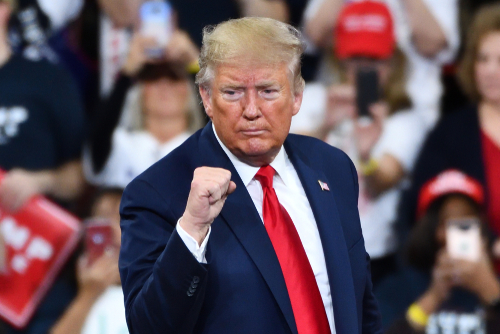
In a recent development that has raised eyebrows across the nation, former President Donald Trump has voiced his apprehensions regarding the hostage release deal with Hamas. Despite the liberation of numerous hostages, not a single American citizen was included in the initial groups freed, a fact that Trump highlighted as a sign of disrespect towards the United States and its leadership.
Trump took to social media to express his unease about the situation, suggesting that the absence of Americans among those released indicates a troubling lack of regard for the country by the terrorist organization. His comments come amid a complex negotiation process facilitated by Qatar, with the support of the U.S. and Egypt, aimed at securing the release of 50 hostages over four days during a temporary ceasefire.
🚨 TRUMP SKEPTICAL OF ISRAEL-HAMAS HOSTAGE DEAL OUTCOME
Trump voices concern over the Israel-Hamas hostage talks: "This is not going to end well."
He points out the absence of American releases in the deal despite the release of other nationals.
A snub or strategy by Hamas?… pic.twitter.com/bDshU9WtsX
— Mario Nawfal (@MarioNawfal) November 26, 2023
The deal, which also involves Israel releasing 150 Palestinian prisoners, has been met with mixed reactions. While some view it as a hopeful step towards peace, others, like Trump, fear it may set a dangerous precedent. The former president warned that Hamas might be angling for a “better deal” before agreeing to release U.S. citizens, potentially complicating the already delicate negotiations.
Among the American hostages is young Abigail Mor Edan, who tragically lost both parents in a Hamas attack and recently turned four years old. Her plight and that of other Americans in captivity have become a focal point for those critical of the current administration’s handling of the situation.
Donald Trump threatens Hamas Sympathizers in simple and clear words. #HamasisISIS #HamasTerrorrists pic.twitter.com/0E2wFaiiVQ
— Divya (@I_m_Divya_Gupta) November 18, 2023
President Joe Biden, who was on a Thanksgiving break at the time, expressed hope that Americans would be part of the next group to be released. However, this optimism has done little to quell the growing concern among many that the U.S. may not be wielding enough influence to ensure the safety and return of its citizens.
The international community has watched as the Red Cross vehicles transported the released hostages to safety, a poignant reminder of the ongoing human cost of the conflict. Meanwhile, tens of thousands of Israelis gathered in Tel Aviv, rallying for the return of their compatriots, and Palestinians celebrated the release of prisoners in the West Bank.
Qatar remains hopeful that the agreement could be extended, allowing for more hostages to be freed. Yet, the uncertainty surrounding the fate of the American hostages continues to cast a shadow over these developments. The Qatari spokesman acknowledged the challenges inherent in such mediations, noting that accusations of non-compliance with the agreement are common from both sides.
As the world awaits further news on the release of hostages, Trump’s chilling prediction looms large. His assertion that the situation “is not going to end well” reflects a broader anxiety about the potential for increased demands from Hamas and the implications for future negotiations.
The unfolding events serve as a stark reminder of the complexities of international diplomacy and the precarious balance between achieving peace and maintaining national dignity. With American lives hanging in the balance, the pressure mounts for a resolution that brings them home safely while upholding the respect and authority of the United States on the global stage.











